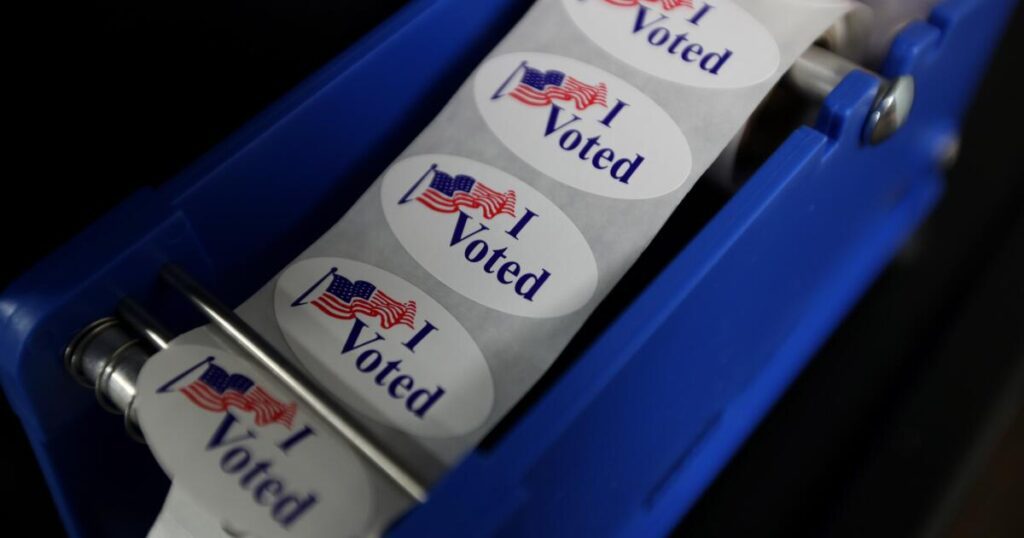The state of California has sued Huntington Beach, alleging that a new city law requiring voters to show a photo ID is a violation of state law.
The 320-page lawsuit, filed Monday in Orange County Superior Court, accuses Huntington Beach of violating the California Constitution and state election law over a new charter amendment requiring voters to show photo ID in local elections beginning in 2026.
Huntington Beach argued that the city charter gives local officials the authority to handle municipal issues, including local elections. In addition to the photo identification requirements, the amendment requires Huntington Beach to provide 20 in-person polling places and monitor ballot drop boxes.
Atty. Huntington Beach's charter does not exempt the city from following state laws governing voter registration and election integrity, Gen. Rob Bonta said Monday. The photo identification requirement is “not only misleading, it is blatantly illegal,” Bonta said at a news conference in downtown Los Angeles.
“They have greatly overestimated the power they believe they have,” said Bonta, a Democrat. “They knowingly broke the law, they brazenly broke the law. … They know exactly what they're doing, and they're doing it anyway.”
Huntington Beach voters approved the law by passing Measure A on the March 5 ballot, with 53.4% support. “Huntington Beach residents have made their voices clear on this issue,” Huntington Beach city attorney Michael Gates said in a statement.
“The city will vigorously support and defend the will of the people,” Gates said.
Bonta's lawsuit is the latest tussle between California and Huntington Beach, which has positioned itself in the crosshairs of state lawmakers and the nation's culture wars since the start of the COVID-19 pandemic.
Over the past four years, officials in the conservative beach city have declared it a “no mask, no vaccine” city, sued the state over zoning requirements for housing additions and a “sanctuary city” immigration law, and created a committee to screen children’s books at the city library because Sexual Content She agreed to conduct voter identification for the March ballot despite threats of a lawsuit.
After the Huntington Beach City Council began discussing a voter ID measure last fall, Bonta and Secretary of State Shirley N. Weber, California's top elections official, warned in a letter to city officials that the measure was illegal and could lead to a lawsuit.
California law requires voters to verify their identities when they register to vote and imposes criminal penalties for fraudulent registration, Bonta and Weber wrote. The state does not require photo identification at the polls but does ask voters to provide their names and addresses.
The Huntington Beach City Council voted 4-3 in October to put a voter ID law on the March ballot.
Councilmembers Tony Strickland and Grace Van Der Mark, who supported the measure, wrote in their election argument that “extreme policies” allowing noncitizens to vote “have proliferated” and that the measure “will protect Huntington Beach's elections forever.”
Three council members who opposed the measure said the city's elections, which are overseen by the Orange County Registrar of Voters, are secure and that Huntington Beach was not prepared to supervise its own elections.
Weber, a Democrat, said Monday that her office is investigating allegations of voter fraud and “has not found that California, nor any other state, has a massive amount of fraud.”
The voter ID measure “is really a solution in search of a problem,” Weber said.
A Huntington Beach resident filed a lawsuit in November to block the voter identification procedure. The ACLU of Southern California and Disability Rights California filed briefs in support of the lawsuit, arguing that voter ID laws impose severe burdens on black, Latino and low-income voters.
Orange County Superior Court Judge Nick Dorbitas declined to block the measure from appearing on the ballot, but wrote in his December ruling that if the measure passed “and if its implementation raises a constitutional issue, then at that point it may be appropriate.” Judicial review. “.
Bonta Huntington Beach warned last fall that another aspect of the charter amendment — ballot box monitoring — could also violate state law.
The state's lawsuit did not mention the drop boxes. Bonta said state officials will monitor how the Huntington Beach law is implemented to ensure it does not conflict with the prohibition on taking photos, videos or otherwise registering voters at polling places or ballot drop boxes “with the intent to discourage another person from voting.” “.
